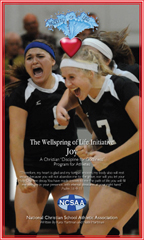A Fruit of the Spirit
By Nate Hartman
October 17, 2011 This is the tenth in a season-long series of posts on the topic of joy, as it relates to the life and athletic pursuits of your teams. These weekly posts will correspond with each weekly study from The Wellspring of Life Initiative, a unique "Discipline for Godliness" program for athletes developed by the NCSAA (and available to all member schools, as part of their membership). This post corresponds with Week 9: "A Fruit of the Spirit."
This is the tenth in a season-long series of posts on the topic of joy, as it relates to the life and athletic pursuits of your teams. These weekly posts will correspond with each weekly study from The Wellspring of Life Initiative, a unique "Discipline for Godliness" program for athletes developed by the NCSAA (and available to all member schools, as part of their membership). This post corresponds with Week 9: "A Fruit of the Spirit."
16 So I say, walk by the Spirit, and you will not gratify the desires of the flesh. 17 For the flesh desires what is contrary to the Spirit, and the Spirit what is contrary to the flesh. They are in conflict with each other, so that you are not to do whatever you want. 18 But if you are led by the Spirit, you are not under the law.
19 The acts of the flesh are obvious: sexual immorality, impurity and debauchery; 20 idolatry and witchcraft; hatred, discord, jealousy, fits of rage, selfish ambition, dissensions, factions 21 and envy; drunkenness, orgies, and the like. I warn you, as I did before, that those who live like this will not inherit the kingdom of God.
22 But the fruit of the Spirit is love, joy, peace, forbearance, kindness, goodness, faithfulness, 23 gentleness and self-control. Against such things there is no law. 24 Those who belong to Christ Jesus have crucified the flesh with its passions and desires. 25 Since we live by the Spirit, let us keep in step with the Spirit. 26 Let us not become conceited, provoking and envying each other.
Galatians 5:16-26
- According to this passage, why is a person able to show joy in his life? What enables a person to “not gratify the desires of the flesh” (v. 16)? Do you ever feel like you’re trying to “force” yourself to be joyful, just because you know God desires it (or because others expect it)? However, is verse 22 a command instructing you to be joyful; is this fruit produced by your own efforts? By what is this fruit produced (v. 22)? Is this truth (that joy will come naturally, as a result of God’s spirit in you) cause for encouragement for you? Why or why not?
- Do you “belong to Christ Jesus”? If so, what is true of you (v. 24)? Are you able to live joyfully, and what might you do to “keep in step with the Spirit” (v. 25)? Are there ways that you and your teammates can help one another to do so?
- If you don’t “belong to Christ Jesus,” are you able to overcome the temptations of your own sinful nature (v. 24)? What are some of the acts that a person motivated by his own passions and desires will do (v. 19-21)? What will be consequence of a life lived in this way (v. 21)?
- Do you struggle to control your athletic habits? Have you been encouraged to “try harder” or “be more dedicated” to overcome those struggles? Will your problem be fixed solely by increased effort on your part, or must you first rely on something else?
- How can you “live by the Spirit”, rather than be overcome by the habits of your flesh (sinful nature)? (We’ve already read that you can’t do this by your own efforts, so what is a person to do?) In order to “walk by the Spirit” (v. 16), be “led by the Spirit” (v. 18), “live by the Spirit,” or “keep in step with the Spirit” (v. 25), you must spend time where? With whom will you walk and live? Whom will you follow? How can you spend time with God, in order that He may produce the fruits of godliness in you?
- Against what habits does verse 26 warn? Are any of these problems for you, or on your team? Are you ever be tempted to be proud? Do you ever provoke your teammates or opponents to anger, and what motivates you to try to do so? Are you ever jealous of teammates? Keeping in mind the concept of living by the Spirit, what might help to solve some of these problems on your team? How can you commit, as a team, to living by the Spirit?
Related Topics



